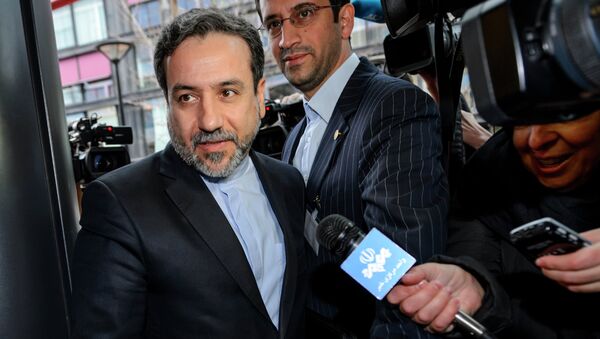The nation's deputy foreign minister, Abbas Araqchi, reportedly said that Iran's move to decrease its commitment to the JCPOA, also known as the Iran nuclear deal, was a national decision and would be irreversible, as Tehran's demands have not been met.
"The European signatories of the deal lack the will to save the deal. Our decision to decrease our commitment to the deal is a national decision and it is irreversible as long as our demands are not met", Araqchi said after meeting the British minister for the Middle East in Tehran, according to Reuters.
Iran Supreme National Security Council Secretary Ali Shamkhani said earlier that the country is not currently considering the possibility of any state mediating an Iran-US dialogue on the JCPOA.
"Mediation is out of the question in the current situation. The United States has unilaterally withdrawn from the JCPOA, it has flouted its obligations and it has introduced illegal sanctions against Iran. The United States should return to the starting point and correct its own mistakes. This process needs no mediation", Shamkhani said.
Meanwhile, the German Foreign Ministry said that a meeting of the Joint Commission of the JCPOA would be held in Vienna on 28 June at the level of political directors, alongside continuing escalation in the Middle East.
The EU diplomatic service said earlier in the day that the meeting would be aimed at resolving problems caused by US sanctions and reviewing statements by Iran regarding the fulfillment of its nuclear commitments.
Tensions have been on the rise between the United States and Iran since Washington pulled out of a nuclear deal. Tensions rose further after Washington accused Tehran of attacking oil tankers and deployed warships in the Persian Gulf.
Most recently, the Iranian Islamic Revolutionary Guard Corps on Thursday downed a US Northrop Grumman RQ-4 Global Hawk surveillance drone in the coastal Hormozgan Province, stressing that the spy drone was in violation of Iran airspace. The US Central Command claimed that an Iranian missile shot down the Navy drone while it was operating in international airspace over the Strait of Hormuz.
Reacting to these developments, US President Donald Trump initially said Iran had made "a very big mistake" but later told reporters that he doubted the drone was shot down intentionally. Some US lawmakers, however, called for taking military action against Iran over the incident.
The New York Times reported Thursday, citing senior US administration officials, that Trump had authorized strikes on a number of targets in Iran but then called off his decision.
Earlier in the day, Kremlin spokesman Dmitry Peskov called the situation in the Persian Gulf tense and extremely worrying. Russian Deputy Foreign Minister Sergey Ryabkov said that the danger of a conflict between the United States and Iran has not disappeared and that Moscow urges Washington to weigh the consequences and avoid ill-advised decisions.




